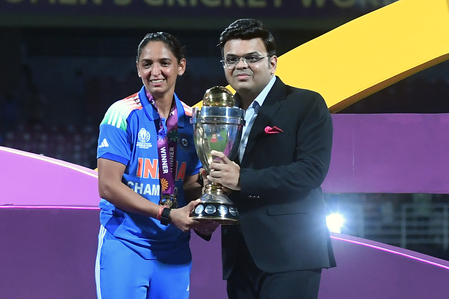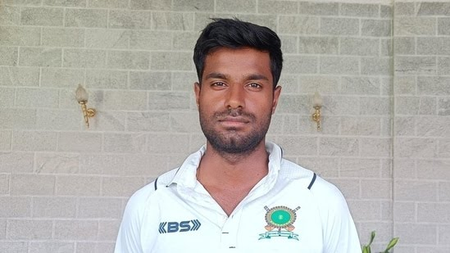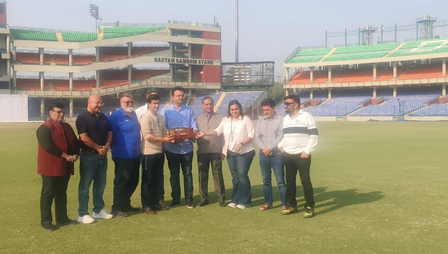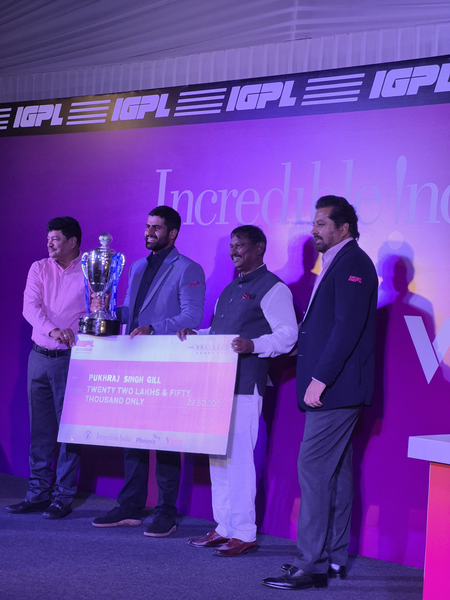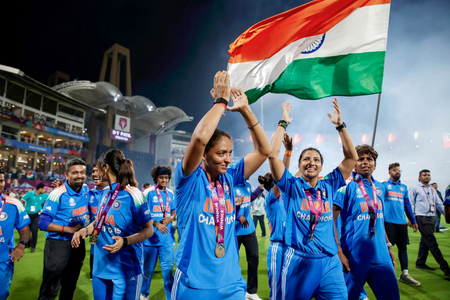
New Delhi, Nov 9 (IANS) A home World Cup and a billion hopes riding on every game – the constant chatter around India’s campaign in the 2025 Women’s ODI World Cup was that this was their best chance to win the silverware. For Radha Yadav and the Women in Blue, the journey to their maiden World Cup title was an emotionally charged roller coaster, testing their resolve to win the trophy at every turn.
Through pressure, setbacks, and moments of jeopardy, India hung in there, rectified themselves, and ultimately won the trophy at the DY Patil Stadium in Navi Mumbai to send the cricket-mad nation into frenzy. It’s a triumph that has changed the lives of Radha and the Indian team forever – even if the full magnitude of their achievement hasn’t quite sunk in yet.
In an exclusive conversation with IANS, Radha, who claimed four crucial wickets in India’s last three games in the tournament, opens up about this special victory, getting game time from the clash against Bangladesh, the support within the team, and what’s the next goal for this side. Excerpts:-
Q. What was it like celebrating this win with teammates you’ve shared so many years and memories with?
A. It is very special. I will say one thing – we have seen many defeats and losses in the finals. Everyone was like ‘We have to do something’. When you say it straight from the heart, it happens. Everyone was happy and motivating each other. Everyone was talking to each other, ‘We have to win the World Cup. It is in India and it will be very special.
We talked a lot and there were very hard times. We had gone for the Mahakaal darshan in Ujjain as well. So I think from there, that belief we got was different. Everyone was inclined in that direction that it is God’s will – you can’t do much, you can do whatever you can do and leave everything to God.
Q. You started the tournament on the sidelines and came into the playing eleven from the Bangladesh game. What was going through your mind during that phase?
A. There’s a team combination on a certain pitch against a certain position, and you can’t control a lot of things. It’s important to respect the team’s decision. I would say that I focused on what I can do, what is in my hands, and how I can contribute now. So I looked at it from that perspective – whenever I’m playing or not playing.
If I’m in the team, like a team member, I always help in any situation – even if it’s giving out water, or going for fielding when you’re 12th player. That’s my job also, as it’s a team sport – you have and should do all these things. It’s because at the end of the day, you don’t have anything else in your hands.
But it’s in your hands on how you’re supporting your team. So when I got the chance to play, I was very nervous because whenever you don’t start, you don’t know that feeling. When you’re sitting outside, it’s like, you start thinking a lot mentally. Like what will happen? How will it happen?
When you’re playing, you don’t have much time to think – you’re just in action. Whenever you get off time, you’re fielding or you’re sitting outside, and you’re looking at things. So I think it was a little difficult for me, but I was nervous too. But I felt good that I played and contributed a little.
Q. Can you take us through that process of executing the sharp run-out of Nigar Sultana?
A. I think when she was hitting her shots, I saw that she was slowly going back to her position. I noticed it 3-4 times and then I said, ‘I have to hit a throw on the stump. Let’s see what happens’. When I hit the throw (from point), it became a run out (at the non-striker’s end).
I was like, ‘Yeh kya ho gaya (what has happened)’? But it felt very good to make a run out like that. Everyone was in shock actually, because that run out came from such a short distance and when she was going back to the crease. So everyone was like, ‘What happened’?
Q. You have been varying your release points, lines and pace. How important was it to work on these aspects to adapt to the 50-over format?
A. You have to do that because there is a long 10-over spell to bowl. So you have to do those things and bowl your variations. Our bowling coach, Avishkar Salvi, explained a lot of things to us – that you can do this and he added to the planning. By developing those things, it eases out for us.
Q. How have Harmanpreet Kaur and Amol Muzumdar helped shape your role and confidence in this campaign?
A. There has been a lot of contribution – not just theirs (of Harmanpreet and Muzumdar), but everyone’s. I always say that you don’t just get support from one or two people – it is very important to get support from everyone in the team.
Otherwise, you can win matches, but not tournaments, if you don’t have everyone’s support. If we win a tournament, you can understand how much support we had for each other.
Everyone gave equal support, whether it was good or bad, or when everyone made a lot of execution errors. But we had to believe in each other and that faith of ‘we have seen you do it before. You can do it again now’. So it is very important to push and keep that belief with positivity.
Q. After this World Cup, do you feel DY Patil Stadium has earned a special place in the hearts of the Indian team?
A. Absolutely. You can see the record. Whenever we have come to the DY Patil Stadium, we have done something special. I think this has become a home ground for all of us. DY Patil is very special now.
Q. Did you get a chance to watch the highlights of the final?
A. No, I like to be in the present. I don’t watch a lot of things. It affects you mentally, you can’t move forward and then you will be stuck. I have practised this a lot. I am not sure if I will be able to do that. I don’t watch a lot. I don’t even watch my own videos – whether I do it well or not. If there are any technical errors, I can watch them. I don’t think I watch a lot of videos.
Q. What’s next for this Indian team? How do you see the group building from here after such a historic win?
A. I would like to say one thing – our focus will be on the next World Cup. It’s not just that I practise it personally – everyone practises how to be in the present. You can’t be in one thing for a long time. You should take what you have and move forward – only then you can be successful. I am sure everyone will do the same. We will now focus on what will come next.
–IANS
nr/ab

